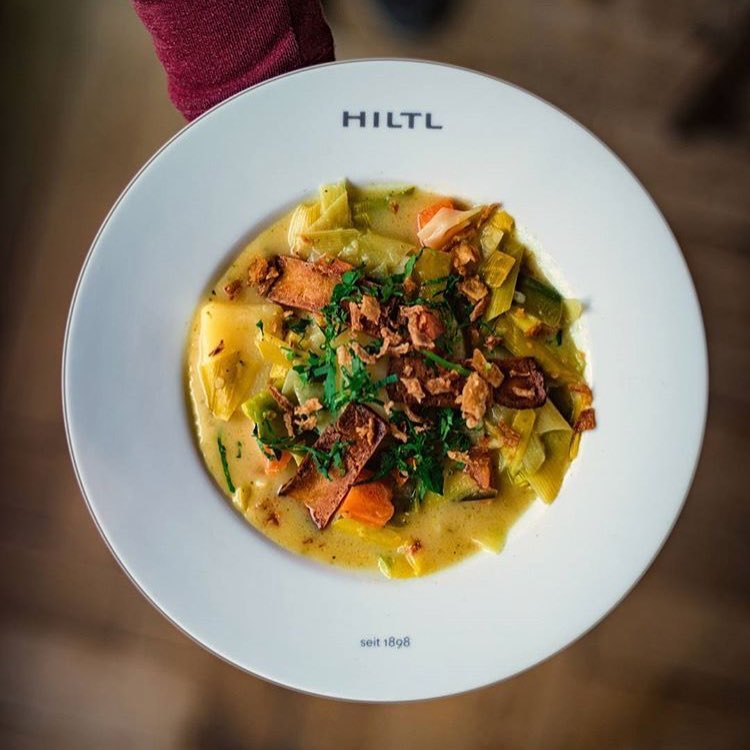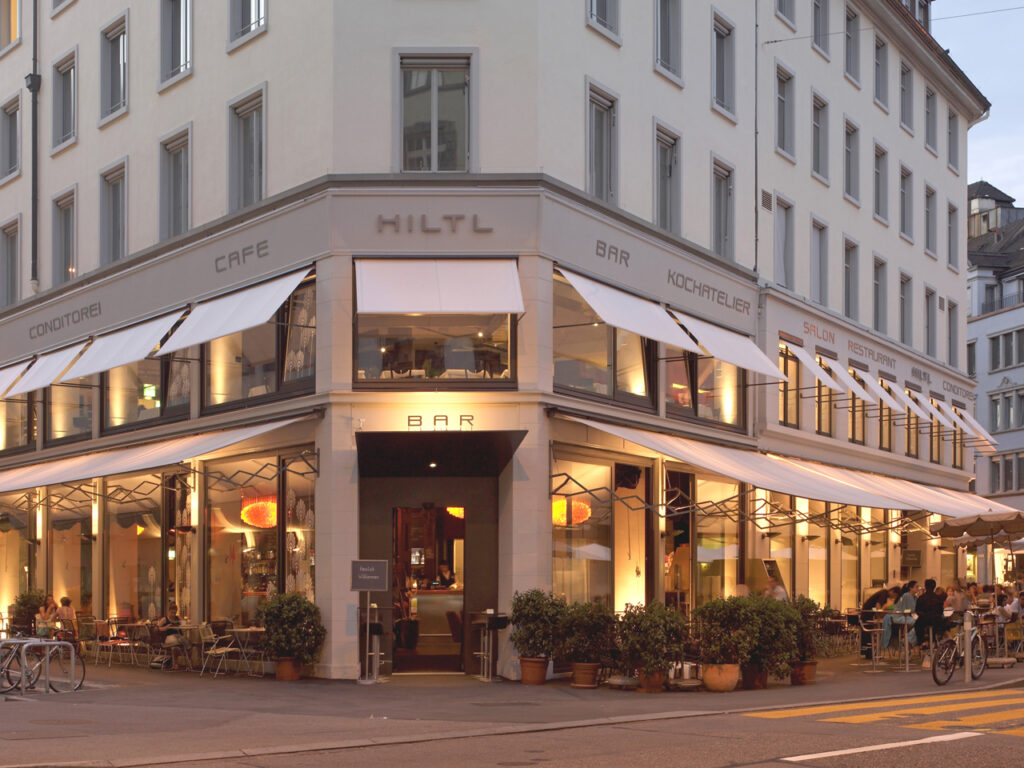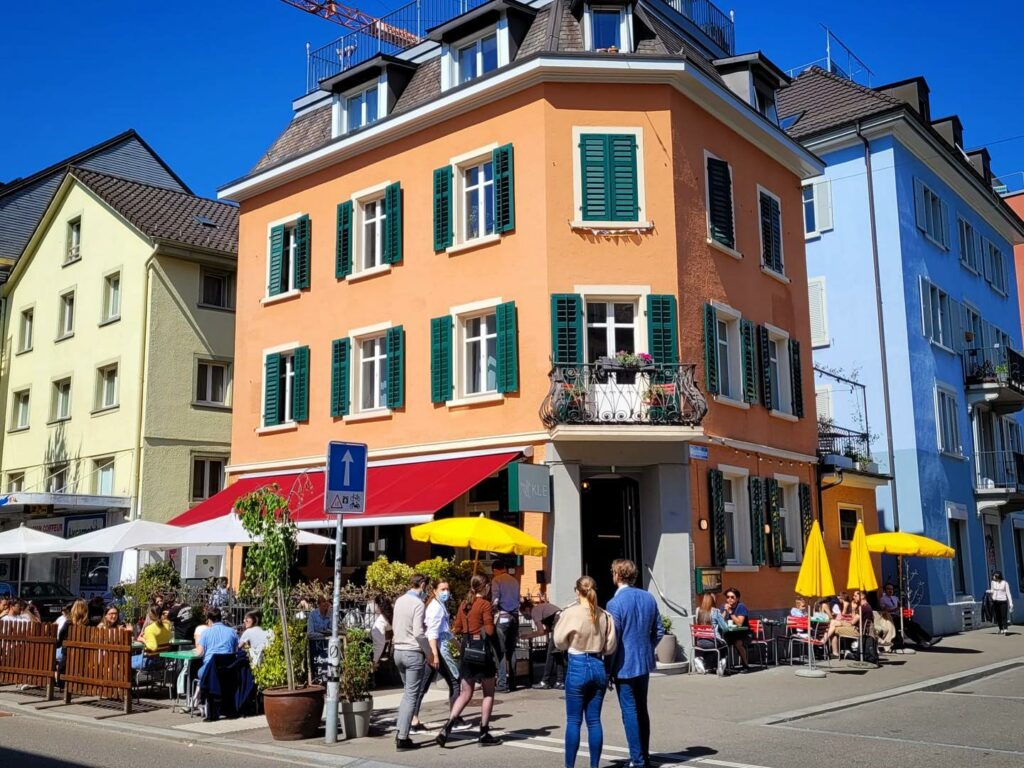mer, Jan 11th 2023

(Credit: Haus Hiltl)
Cheese and sausage is likely what comes to mind when you think of Swiss cuisine — the kind of food that sticks to skiers’ ribs when they’re stationed at a rustic mountain chalet. And while most traditional Swiss dishes do require a cow, the Swiss have a surprisingly long reputation for embracing plant-based diets. Moreover, the path forward looks to be paved in fruits and vegetables.
A report by Swissveg, which represents vegetarians and vegans in Switzerland, states that while the number of committed vegans remains small (under 1% of the population), the figure for vegetarians has risen at such a rate that Swissveg predicts in five years’ time 10% of the population won’t eat meat at all. Perhaps most significantly, a much larger proportion are cutting down on the amount of animal protein they consume. Some 60% of respondents in Swiss supermarket Coop’s Plant Based Food Report 2022 consider themselves flexitarians, regularly forgoing meat and dairy in their diets, up from 40% in 2012.
Perhaps it shouldn’t be a surprise. Periods of voluntary vegetarianism have historically been part of life for many religious families in Switzerland, states the Swiss National Museum, and since meat was (and still is) expensive, it wasn’t eaten every day by the working classes anyway. From the late 19th century onwards, upper middle-class proponents of the Swiss Lebensreform (‘life reform’) movement, which developed as a reaction to industrialisation and mass production, advocated for vegetarianism and veganism as part of a healthy lifestyle.
A major figure in the Lebensreform movement was Swiss physician Maximilian Oskar Bircher-Benner, who opened a clinic in Zurich in the late 19th century which aimed to treat patients with a strict raw food diet. The eponymous dish he devised back then – Birchermüesli – is now as tied to Switzerland as fondue and chocolate.

Haus Hiltl is the oldest vegetarian restaurant in the world (credit: Haus Hiltli).
One of Bircher-Benner’s patients was Ambrosius Hiltl, who became a devoted vegetarian after his rheumatism was cured under the doctor’s care. In 1904 he took over an ailing vegetarian restaurant in the city. Haus Hiltl, certified by Guinness World Records as the world’s oldest vegetarian restaurant, is still going strong in Zurich today; and in 2000 the Hiltl family also co-founded Tibits, a vegetarian chain with outlets across the country.
It’s therefore apt that Zurich currently leads the way in Switzerland’s plant-based food scene. Coop’s report shows that in 2021, the commune of Zurich topped the table for consumption of meat and milk substitutes, closely followed by other areas in German-speaking Switzerland (only one commune outside the language region made the top 15), while the Swiss Vegan Awards 2022 were dominated by Zurich businesses. A stroll around the city bears this out: from the vegan pastries and chocolate of Moon to the plant-based delicacies of Devi Deli, and vegan restaurants including KLE and Marktküche, Zurich is stuffed full of plant-based options.

Vegan chocolatier Moon with some of their creations (credit: Moon).
“Definitely in the last three years the development of vegan food here in Zurich has been incredible, probably the fastest I’ve seen in any city,” says vegan baker Bianca Legorreta, who set up White Rabbit Bakery in 2020 after the Danish business graduate’s vegan cinnamon rolls got attention on Instagram. A year later she opened the shop Moon with vegan chocolate maker Britta Kürzi. The two could barely bake fast enough to satisfy the lines stretching around the block.
“Zurich, and Switzerland in general, are always a little bit behind, but when the trend comes, [people] have money and enough free time to investigate it,” Legorreta says of her adopted home, adding that many people choose to work part time and start a business on the side. “That’s a very typical thing that I’m seeing more and more now.”
Spanish-born chef Zizi Hattab, who opened acclaimed plant-based restaurant KLE in 2020, feels that Zurich’s cosmopolitan nature has also contributed to the rise of meat-free eating.
“There are a lot of expats from everywhere in the world who are here and eating out, so there’s a culture of trying different restaurants and being open-minded and aware of our impact on the environment,” she says.
The former software engineer chose to create a plant-based menu since she saw it as “the fastest and most effective way to reduce the impact of the restaurant on the environment.” At the time, it was hard to find vegan food in Zurich, she says, but the scene has since grown exponentially, a shift she attributes in part to the Covid-19 pandemic, which gave people “more time to read, more time to think about their health and the impact of what they eat.”

KLE is one of the hottest reservations in Zurich (credit: KLE).
Not least chefs, who, sometimes for the first time in their careers, had to stop working when lockdown shuttered their restaurants.
“I have seen a lot of [chef] friends who would have never considered cooking vegan who now offer vegan tasting menus next to their regular menus,” says Hattab. “I think it was an opportunity for all of us to rethink what we are doing, and if we wanted to be part of something else … to collaborate for a greater good.”
That reflects the attitude of Swiss flexitarians in Coop’s survey, who gave “the environment” and “health” as the top two reasons for their choice of diet. It also tallies with research carried out by Zurich-based start-up Planted, founded in 2019, whose plant-based meat substitutes are available in supermarkets across the country.
“In our qualitative research it was really health and sustainability reasons that made people eat less meat and more plant-based,” says Vicky Kummer, Planted’s Head of Corporate Communications, “and I do think these were two aspects that were driven through the pandemic. I think Covid had such a strong impact on all our lives you could really see how issues like that could influence your life.”

Planted is giving curious flexitarians new options (credit: Planted).
Planted owes much of its initial success to ETH Zurich, the Federal Institute of Technology where two of its founders studied and which awarded the start-up a Pioneer Fellowship worth 150,000 Swiss francs. Though Kummer stresses that funding and support have come from across Switzerland as a whole and even further afield, it’s clear that the environment provided by ETH Zurich was crucial for the development of their all-natural, additive-free meat substitutes, which the company sees as a USP.
“We have over 65 people here who are in science and product development, most of them coming from ETH, who are really doing pioneering work on the technology, called bio-structuring,” says Kummer.
Of course, substitutes won’t win over die-hard meat eaters, but Kummer, Legorreta and Hattab all say that the majority of their customers aren’t vegans or vegetarians, but simply people looking for good food. So perhaps Zurich’s plant-based boom shows that, with passionate and innovative people leading the way and ever tastier products coming to market, plant-based food can appeal not just to committed vegans but to anyone who likes to eat with an open mind.
“We are showing how good plant-based food can be,” says Hattab. “This is what we do: we change minds not by words, but by taste and by experiences.”
Cet article peut être librement partagé et réimprimé, à condition qu'il renvoie clairement à l'article original.
